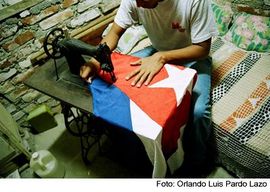
Popular diplomacy needs no memorandums or declarations of intent, it is carried on directly between people without going through foreign ministries or government palaces. It is accompanied by a hug, a handshake, or a long talk in the living room of a home. Without aspiring to bright lights or headlines, ordinary people have rid the world of many wrongs, perhaps have avoided wars without number, and may even be responsible for certain alliances and some, few, moments of peace.
Occasionally, an individual without ministerial credentials or official privileges speaks to power, throwing out a question that remains unanswered. As Cubans we have to be content with the fact that no one from "up there" will try to explain to us or consult with us about this Island's course, which feels like a boat taking on water and about to shipwreck. Tired of their not acknowledging us, in our smallness, I decided to throw out seven questions to those who believe--right now and with their actions--that they are determining the fate of my country.
The conflict between the governments of Cuba and the United States not only prevents the people of both shores from establishing smooth relations, but also determines the steps, of the lack thereof, that must be taken for the necessary transformation of our society. Political propaganda tells us that we live in a besieged city, David facing Goliath, a "voracious enemy" about to pounce on us. I want to know, from my diminutive position as a citizen, how this dispute is going to play out, when will it cease to be the central theme in every aspect of our lives.
After months of trying I managed to send a questionnaire to the American president, Barack Obama, with some of the issues that keep me from sleeping. I already have his answers, which I will publish tomorrow, and now I want to extend my questions to the Cuban president, Raul Castro. They are questions, born from my personal experience and I recognize that each one of my fellow citizens might have worded them differently, in their own way. The doubts that they entail are so distressing that I can't allow myself to envision what kind of country my children will grow up in.
Here are both questionnaires.
Questions for Raul Castro, president of Cuba:
- What negative influences on the ideological structure of the Cuban revolution might there be from an eventual improvement in relations with the United States?
- You have demonstrated on several occasions your willingness to talk with the American government. Are you alone in this proposition? Have you discussed it with the other members of the Politburo to convince them of the need to talk? Does your brother Fidel Castro agree with regards to ending the conflict between the two governments?
- You are seated at a table opposite Obama. What are the three major achievements you would wish to get from that conversation? What do you think would be the three major achievements that the American side would wish to get?
- Can you list the concrete advantages the Cuban people would have in the present and in the future, if this long dispute between the two governments ended?
- If the American side wanted to include a round of negotiations with the Cuban community in exile, members of opposition parties within the Island, and representatives of civil society, would you accept that proposal?
- Do you think there is a real possibility that the current United States government would opt to use military force against Cuba?
Questions for Barack Obama, president of the United States:
- For years Cuba has been a U.S. foreign policy issue as well as a domestic one, in particular because of the large Cuban American community. From your perspective, in which of the two categories should the Cuban issue fit?
- Should your administration be willing to put an end to this dispute, would it recognize the legitimacy of the Raul Castro government as the only valid interlocutor in the eventual talks?
- Has the U.S. government renounced the use of military force as a way to end the dispute?
- Raul Castro has said publicly that he is open to discuss any topic with the U.S. provided there is mutual respect and a level playing field. Is Raul asking too much?
- In a hypothetical U.S.- Cuba dialog, would you entertain participation from the Cuban exile community, the Cuba-based opposition groups and nascent Cuban civil society groups?
- You strongly support the development of new communication and information technologies. But, Cubans continue to have limited access to the internet. How much of this is due to the U.S. embargo and how much of it is the responsibility of the Cuban government?
- Would you be willing to travel to our country?
Yoani's blog, Generation Y, can be read here in English translation.